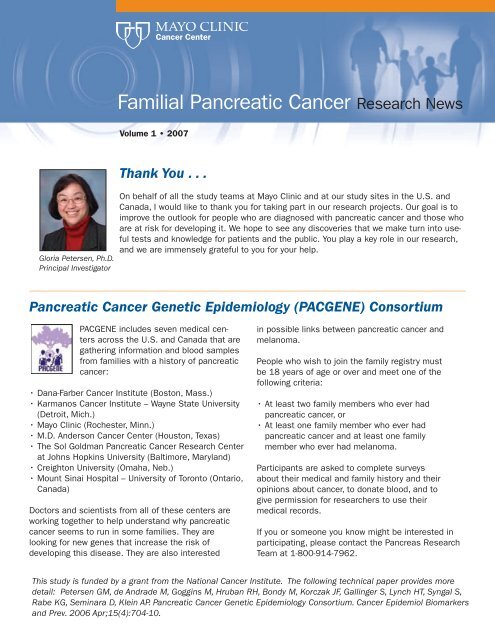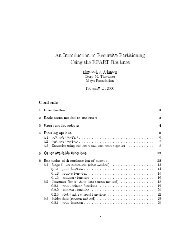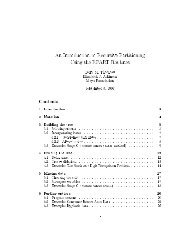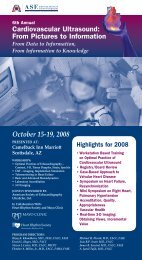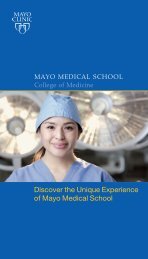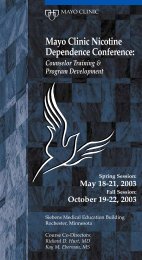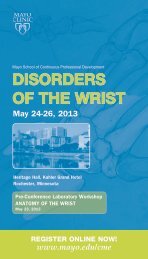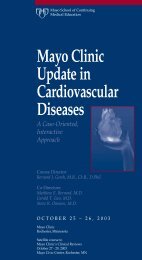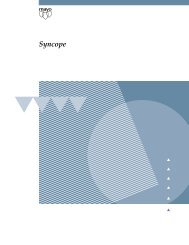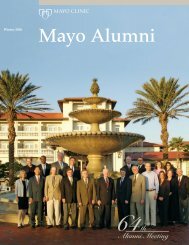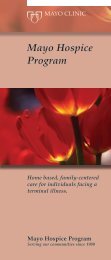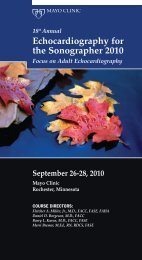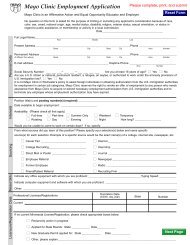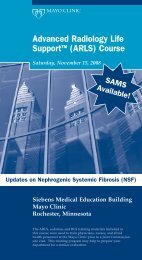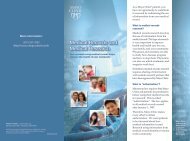Newsletter Familial Pancreatic Cancer Resea ... - Mayo Clinic
Newsletter Familial Pancreatic Cancer Resea ... - Mayo Clinic
Newsletter Familial Pancreatic Cancer Resea ... - Mayo Clinic
Create successful ePaper yourself
Turn your PDF publications into a flip-book with our unique Google optimized e-Paper software.
<strong>Familial</strong> <strong>Pancreatic</strong> <strong>Cancer</strong> <strong>Resea</strong>rch News<br />
Volume 1 • 2007<br />
Thank You . . .<br />
Gloria Petersen, Ph.D.<br />
Principal Investigator<br />
On behalf of all the study teams at <strong>Mayo</strong> <strong>Clinic</strong> and at our study sites in the U.S. and<br />
Canada, I would like to thank you for taking part in our research projects. Our goal is to<br />
improve the outlook for people who are diagnosed with pancreatic cancer and those who<br />
are at risk for developing it. We hope to see any discoveries that we make turn into useful<br />
tests and knowledge for patients and the public. You play a key role in our research,<br />
and we are immensely grateful to you for your help.<br />
<strong>Pancreatic</strong> <strong>Cancer</strong> Genetic Epidemiology (PACGENE) Consortium<br />
PACGENE includes seven medical centers<br />
across the U.S. and Canada that are<br />
gathering information and blood samples<br />
from families with a history of pancreatic<br />
cancer:<br />
• Dana-Farber <strong>Cancer</strong> Institute (Boston, Mass.)<br />
• Karmanos <strong>Cancer</strong> Institute – Wayne State University<br />
(Detroit, Mich.)<br />
• <strong>Mayo</strong> <strong>Clinic</strong> (Rochester, Minn.)<br />
• M.D. Anderson <strong>Cancer</strong> Center (Houston, Texas)<br />
• The Sol Goldman <strong>Pancreatic</strong> <strong>Cancer</strong> <strong>Resea</strong>rch Center<br />
at Johns Hopkins University (Baltimore, Maryland)<br />
• Creighton University (Omaha, Neb.)<br />
• Mount Sinai Hospital – University of Toronto (Ontario,<br />
Canada)<br />
Doctors and scientists from all of these centers are<br />
working together to help understand why pancreatic<br />
cancer seems to run in some families. They are<br />
looking for new genes that increase the risk of<br />
developing this disease. They are also interested<br />
in possible links between pancreatic cancer and<br />
melanoma.<br />
People who wish to join the family registry must<br />
be 18 years of age or over and meet one of the<br />
following criteria:<br />
• At least two family members who ever had<br />
pancreatic cancer, or<br />
• At least one family member who ever had<br />
pancreatic cancer and at least one family<br />
member who ever had melanoma.<br />
Participants are asked to complete surveys<br />
about their medical and family history and their<br />
opinions about cancer, to donate blood, and to<br />
give permission for researchers to use their<br />
medical records.<br />
If you or someone you know might be interested in<br />
participating, please contact the Pancreas <strong>Resea</strong>rch<br />
Team at 1-800-914-7962.<br />
This study is funded by a grant from the National <strong>Cancer</strong> Institute. The following technical paper provides more<br />
detail: Petersen GM, de Andrade M, Goggins M, Hruban RH, Bondy M, Korczak JF, Gallinger S, Lynch HT, Syngal S,<br />
Rabe KG, Seminara D, Klein AP. <strong>Pancreatic</strong> <strong>Cancer</strong> Genetic Epidemiology Consortium. <strong>Cancer</strong> Epidemiol Biomarkers<br />
and Prev. 2006 Apr;15(4):704-10.
<strong>Resea</strong>rch News from the PACGENE Consortium<br />
The <strong>Pancreatic</strong> <strong>Cancer</strong> Genetic Epidemiology<br />
(PACGENE) Consortium has screened over 19,000<br />
patients’ family histories and discovered 1,600<br />
families containing two or more relatives who had<br />
pancreatic cancer. Over 9,800 patients and their<br />
family members are in the study. This is what we<br />
have found so far:<br />
• We have shown that pancreatic cancer in families<br />
seems to occur around 5 to 6 years younger than<br />
the average age (69 years) of the non-familial<br />
patients.<br />
• We have found that some families with pancreatic<br />
cancer are at risk due to genes already<br />
connected to inherited cancer, such as BRCA2 and<br />
p16. These genes account for a small fraction of<br />
familial pancreatic cancer. The basis in the rest of<br />
the families remains unknown.<br />
• Family X, which was reported to be due to the<br />
palladin gene on chromosome #4, appears to be<br />
a unique family. <strong>Pancreatic</strong> cancer in other families<br />
is not explained by this gene.<br />
We are analyzing 5 million DNA results on 1,000<br />
members of 109 families. We hope to have some<br />
findings to share with you in the next issue. In the<br />
meantime, we are still interested in enrolling families!<br />
Please contact us for details.<br />
<strong>Mayo</strong> <strong>Clinic</strong> Pancreas Registry<br />
The Pancreas Registry at <strong>Mayo</strong> <strong>Clinic</strong> was organized<br />
in 2000 with generous funding from <strong>Mayo</strong> <strong>Clinic</strong> and<br />
the Lustgarten Foundation for <strong>Pancreatic</strong> <strong>Cancer</strong><br />
<strong>Resea</strong>rch. The registry exists to gather data and<br />
blood or tissue samples from patients with<br />
various pancreatic conditions, such as pancreatitis,<br />
pancreatic cysts or pancreatic cancer. It is an<br />
important resource for doctors and scientists to study<br />
pancreatic diseases and find new ways to diagnose,<br />
prevent or treat them. Patients who agree to join the<br />
<strong>Mayo</strong> registry are asked to: 1) complete two surveys<br />
about diet, and medical and family history, 2) donate<br />
blood, and 3) give permission for researchers to use<br />
their medical records. Since 2003, the registry has<br />
been supported by a National <strong>Cancer</strong> Institute grant<br />
as part of a Specialized Program of <strong>Resea</strong>rch<br />
Excellence (SPORE) in <strong>Pancreatic</strong> <strong>Cancer</strong>.<br />
<strong>Pancreatic</strong> <strong>Cancer</strong> <strong>Resea</strong>rch Update<br />
BRCA2 and <strong>Familial</strong> <strong>Pancreatic</strong> <strong>Cancer</strong><br />
BRCA2 is a gene that was discovered in families with<br />
breast cancer. Doctors at <strong>Mayo</strong> <strong>Clinic</strong>, Johns Hopkins<br />
University and Mount Sinai Hospital studied whether<br />
BRCA2 also is related to pancreatic cancer. They<br />
found that mutations in the BRCA2 gene account for<br />
6 percent of families with at least two close family<br />
members who ever had pancreatic cancer.<br />
Reference:<br />
Couch FJ, Johnson MR, Rabe KG, Brune K, de Andrade<br />
M, Goggins M, Rothenmund H, Gallinger S, Klein A,<br />
Petersen GM, Hruban RH. The prevalence of BRCA2<br />
mutations in familial pancreatic cancer. <strong>Cancer</strong><br />
Epidemiol Biomarkers Prev. 2007 Feb;16(2):342-6.<br />
Cystic Fibrosis Gene Is a Risk Factor for Young-onset<br />
<strong>Pancreatic</strong> <strong>Cancer</strong><br />
Cystic fibrosis is an inherited condition that causes<br />
mucus in the body to become thick and sticky,<br />
causing problems in many organs, especially the lung<br />
and the pancreas. People with cystic fibrosis often<br />
have difficulty breathing and have problems with<br />
nutrition, digestion, and growth. Some of these people<br />
also develop chronic pancreatitis.<br />
Doctors at <strong>Mayo</strong> <strong>Clinic</strong> searched for mutations in the<br />
cystic fibrosis gene (CFTR) in patients with pancreatic<br />
cancer. They found that twice as many people who<br />
were diagnosed with pancreatic cancer before age 60<br />
carry mutations in the CFTR gene compared to the<br />
general population.<br />
Reference:<br />
McWilliams R, Highsmith WE, Rabe KG, de Andrade M,<br />
Tordsen LA, Holtegaard LM, Petersen GM. Cystic<br />
fibrosis transmembrane regulator gene carrier<br />
status is a risk factor for young onset pancreatic<br />
adenocarcinoma. Gut. 2005 Nov;54(11):1661-2.<br />
2 <strong>Familial</strong> <strong>Pancreatic</strong> <strong>Cancer</strong> <strong>Resea</strong>rch News • Volume 1 • 2007
Message from the Study Coordinators<br />
Jodie Cogswell and Cindy Chan<br />
Study Coordinators<br />
Since we joined the study team at <strong>Mayo</strong> <strong>Clinic</strong> in 2006, we have enjoyed<br />
working directly with you and your families on this important cancer research.<br />
Thank you all for your time and dedication to provide us with information and<br />
blood samples. Without your help, our research would not be possible.<br />
We are excited to be a part of the effort to learn more about pancreatic<br />
cancer and to improve its medical care. We look forward to continuing our<br />
work with you! If you have any questions, please do not hesitate to contact<br />
us at 1-800-914-7962 or pancreas@mayo.edu.<br />
New <strong>Resea</strong>rch Opportunity<br />
Mark Topazian, M.D.<br />
Principal Investigator<br />
<strong>Cancer</strong> of the Pancreas Screening<br />
(CAPS 3) Study<br />
<strong>Cancer</strong> of the Pancreas<br />
Screening (CAPS 3) is a new<br />
study that aims to find the best<br />
way to screen for pancreatic<br />
cancer. Five medical centers<br />
across the U.S. are working<br />
together on this study:<br />
• Johns Hopkins University (Baltimore, Maryland)<br />
• <strong>Mayo</strong> <strong>Clinic</strong> (Rochester, Minn.)<br />
• M.D. Anderson <strong>Cancer</strong> Center (Houston, Texas)<br />
• University of Alabama (Birmingham, Ala.)<br />
• University of California, Los Angeles<br />
The screening includes a genetic counseling session,<br />
blood tests, an MRI, a CT scan and an endoscopic<br />
ultrasound (EUS). The cost of these procedures will<br />
be covered by the study, but the cost of travel to one<br />
of the medical centers will not be covered.<br />
People who are interested in taking part in the CAPS<br />
3 study must meet one of the following criteria:<br />
• At least two close family members (parent, sibling<br />
or child) who ever had pancreatic cancer, or<br />
• Diagnosis of Peutz-Jeghers syndrome, or<br />
• BRCA2 or FAMMM (p16/CDKN2A) gene mutation<br />
and at least one family member who ever had<br />
pancreatic cancer.<br />
The study has been enrolling participants at Johns<br />
Hopkins University since early 2007. Enrollment for<br />
the study at <strong>Mayo</strong> <strong>Clinic</strong> also is starting.<br />
For more information about the CAPS 3 study at <strong>Mayo</strong><br />
<strong>Clinic</strong>, please contact:<br />
Jodie Cogswell, Study Coordinator<br />
1-800-914-7962, extension 3<br />
cogswell.jodie@mayo.edu<br />
Glossary<br />
Computerized tomography (CT) scan: A procedure using<br />
X-rays to produce detailed cross-sectional images of<br />
organs in the body.<br />
Endoscopic ultrasound (EUS): A procedure using<br />
ultrasound waves to produce detailed images of<br />
organs in the body. An ultrasound probe is attached<br />
to an endoscope, which is a fiber optic tube used to<br />
look inside the intestinal tract.<br />
<strong>Familial</strong> atypical mole-malignant melanoma (FAMMM)<br />
syndrome: An inherited condition that includes having<br />
at least one family member who ever had melanoma<br />
and having more than 50 moles. FAMMM syndrome<br />
increases the risk of developing melanoma.<br />
Mutations in the p16 and CDKN2A genes were<br />
discovered in families with this syndrome.<br />
Magnetic resonance imaging (MRI): A procedure using<br />
radio waves and strong magnets to produce detailed<br />
cross-sectional images of the body.<br />
Peutz-Jeghers syndrome (PJS): An inherited condition that<br />
causes many polyps in the small intestine and colon.<br />
PJS increases the risk of developing intestinal and<br />
other cancers.<br />
<strong>Familial</strong> <strong>Pancreatic</strong> <strong>Cancer</strong> <strong>Resea</strong>rch News • Volume 1 • 2007 3
<strong>Pancreatic</strong> <strong>Cancer</strong> Facts<br />
• <strong>Pancreatic</strong> cancer is a serious disease for which<br />
little is known.<br />
• An estimated 37,170 Americans will be diagnosed<br />
with pancreatic cancer in 2007.<br />
• The risk of developing pancreatic cancer is about<br />
the same for both men and women.<br />
• <strong>Pancreatic</strong> cancer seems to run in some families.<br />
Five to ten percent of pancreatic cancers may be<br />
related to inherited gene mutations. These<br />
mutations often increase the risk for certain other<br />
cancers as well.<br />
Prevention<br />
Suggested lifestyle changes to help reduce the risk of<br />
pancreatic cancer:<br />
• Quit smoking. Smokers are two to three times<br />
more likely to develop pancreatic cancer than<br />
non-smokers.<br />
• Maintain a healthy weight and exercise regularly. People<br />
who are very overweight or physically inactive may<br />
have a greater risk of developing pancreatic cancer<br />
than people who are not.<br />
• Eat a healthy diet. A diet high in animal fat and low<br />
in fruits and vegetables may increase the risk of<br />
pancreatic cancer.<br />
Source:<br />
American <strong>Cancer</strong> Society <br />
Resources<br />
<strong>Pancreatic</strong> <strong>Cancer</strong> Action Network, Inc. (PanCAN)<br />
http://www.pancan.org<br />
National advocacy and patient support<br />
organization for pancreatic cancer.<br />
The Lustgarten Foundation for <strong>Pancreatic</strong> <strong>Cancer</strong><br />
<strong>Resea</strong>rch<br />
http://www.lustgarten.org<br />
Non-profit organization for supporting<br />
pancreatic cancer research and education.<br />
What are Family Registries?<br />
Family registries are a way for researchers to discover<br />
the causes of familial cancer. <strong>Resea</strong>rchers from a<br />
variety of fields (epidemiology, gastroenterology,<br />
pathology, oncology, genetics, and surgery) try to find<br />
the unifying genetic and non-genetic features. The<br />
participation of patients and family members is vital<br />
to further the understanding of pancreatic cancer.<br />
A pancreatic cancer registry collects information from<br />
patients and their blood relatives with a strong family<br />
history of pancreatic cancer. Registries examine<br />
lifestyle, environmental, and genetic factors in<br />
addition to family history of pancreatic cancer. Taking<br />
part in a registry usually requires completing questionnaires<br />
on individual and family medical history,<br />
family history of cancer, exposure to environmental<br />
agents, and information about age, ethnicity, education,<br />
and occupational history. Participants may be<br />
asked to provide blood or tissue samples.<br />
Registries need approval by their respective institutions<br />
for safety and privacy to participants. To ensure<br />
privacy, unique study numbers are assigned to the<br />
registry participants. Registries are often protected by<br />
a Certificate of Confidentiality from the federal government.<br />
With this certificate, researchers cannot be<br />
forced by court order to disclose any protected health<br />
information which may identify registry participants.<br />
Reprinted with permission from the <strong>Pancreatic</strong><br />
<strong>Cancer</strong> Action Network, Inc.: “Family Registries.”<br />
Outreach July 2006: 9.<br />
Address: Pancreas <strong>Resea</strong>rch Project<br />
Charlton 6<br />
<strong>Mayo</strong> <strong>Clinic</strong><br />
Rochester, MN 55905<br />
Phone: 1-800-914-7962<br />
E-mail: pancreas@mayo.edu<br />
Website: http://mayoresearch.mayo.edu/mayo/<br />
research/pacgene/<br />
Study Coordinators:<br />
How to Contact Us<br />
Cindy Chan<br />
Jodie Cogswell<br />
MC1185-66


